Corpulent, balding Oskar Sima (1896-1969) was the king of the supporting roles of the Austrian and German cinema. From the 1920s to the late 1960s, the Austrian actor played character roles in over 250 comedies, film operettas and a few dramas.
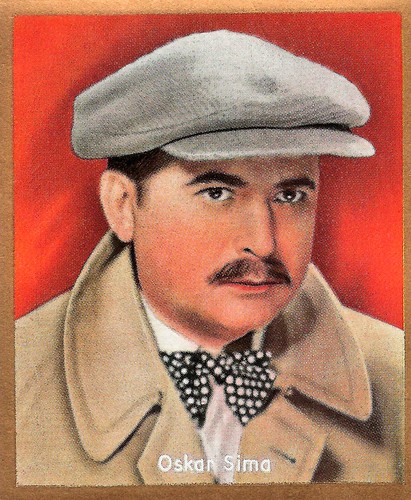
German cigarette card in the series Unsere Bunten Filmbilder by Ross Verlag for Cigarettenfabrik Josetti, Berlin, no. 198. Photo: Ufa.
Oskar Michael Sima was born in Hohenau an der March, Lower Austria, in 1896. He was the son of a baker. Sima attended high school in Vienna, followed by a trade school and then studied acting at the Vienna Conservatory.
In 1919, after his military service during World War I, he received an engagement at the Deutsches Theater in Prague, then at the Deutsches Volkstheater in Vienna. In 1927 he went to Berlin where he worked under Max Reinhardt and Erwin Piscator. Reinhardt recognised his singular comic talent and had him cast in satirical or comedic roles.
Sima’s film career started in 1921. Notable among his silent films are the Austrian Pat and Patachon comedy Schwiegersöhne/Sons in Law (Hans Steinhoff, 1926), and Leontines Ehemänner/Leontine's Husbands (Robert Wiene, 1928), with Claire Rommer and Georg Alexander.
Sima was frequently cast as the comic villain whose machinations get everyone into trouble, although many a times his villainous stature was used to more chilling effect. An example was the German silent crime film Kolonne X/Column X (Reinhold Schünzel, 1929), starring Reinhold Schünzel, Ernst Stahl-Nachbaur and Grete Reinwald. The film attempted to imitate the style of American crime films, switched to a German setting.
Interesting was also the German silent drama Die Frau, nach der man sich sehnt/The Woman One Longs For (Kurt aka Curtis Bernhardt, 1929) starring Marlene Dietrich, Fritz Kortner and Frida Richard. In 1929, Sima married actress Lina Woiwode. The couple remained married until Sima's death.
One of his first sound films was the drama Skandal um Eva/Scandalous Eva (Georg Wilhelm Pabst, 1930 in which he co-starred with Henny Porten. But in the following years, he only played supporting parts, such as in the German comedy drama Die Gräfin von Monte-Christo/The Countess of Monte-Christo (Karl Hartl, 1932) starring Brigitte Helm, the Austrian-German romantic comedy So ein Mädel vergißt man nicht/You Don't Forget Such a Girl (Fritz Kortner, 1932) starring Willi Forst and Dolly Haas, and the comedy Der Glückszylinder/The Magic Top Hat (Rudolf Bernauer, 1932) with Charlotte Ander and Felix Bressart. Many of these directors and actors soon fled the country, including Fritz Kortner, Dolly Haas and Felix Bressart.
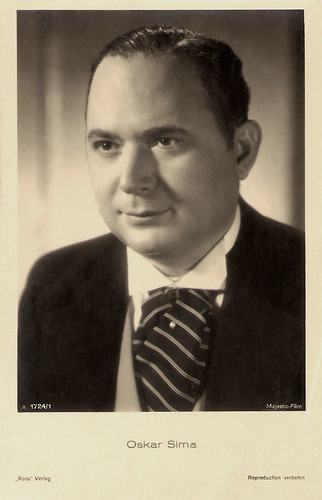
German postcard by Ross Verlag, no. A 1724/1, 1937-1938. Photo: Majestic-Film. Publicity still for 5 Millionen suchen einen Erben/Five Millions Seek an Heir (Carl Boese, 1938).
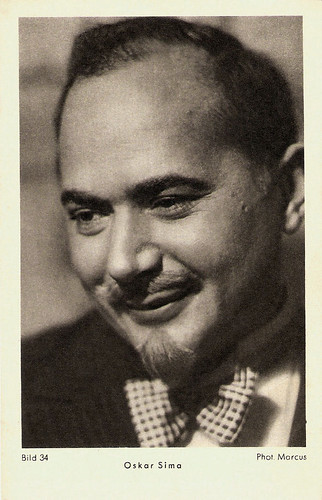
German postcard by Margarinewerk Eidelstedt Gebr. Fauser G.m.b.H., Holstein, Serie 1, no. Bild 34. Photo: Marcus.
During the national socialist era, Oskar Sima was identified as being an active supporter of the Nazi Party. In 1938, he applauded Austria's 'Anschluss' with Germany, and his career thrived during the 1930s. In Hungary he played in the German comedy Skandal in Budapest/Scandal in Budapest (Steve Sekely, Géza von Bolváry, 1933), starring Franziska Gaal. It was made by the German subsidiary of Universal Pictures, and a separate Hungarian-language version was also made. The film was remade in Hollywood as Top Hat (Mark Sandrich, 1935), starring Fred Astaire and Ginger Rogers.
Sima appeared at the side of Heinz Rühmann in the German comedy Heinz im Mond/Heinz in the Moon (Robert A. Stemmle, 1934), but also with Willy Fritsch and Lilian Harvey in the German romantic comedy Glückskinder/Lucky Kids (Paul Martin, 1936). I.S. Mowis at IMDb: “His stock-in-trade character was the surly curmudgeon: sometimes villainous, cigar-chewing and choleric, sometimes shifty and scheming, all the while deceptively amiable. At other times, he provided effective, often scene-stealing comedy relief, as pompous, easily deflatable editors, industrialists or burgomasters.”
Sima regularly returned to Austria for films, e.g. the operetta Zauber der Boheme/The Charm of La Bohème (Géza von Bolváry, 1937), starring Jan Kiepura and Mártha Eggerth.
After Austria had been incorporated into Greater Germany following the 1938 Anschluss, Sima often played in productions by Wien-Film, a Vienna-based company set up by the Nazis. He co-starred with Hertha Feiler and Attila Hörbiger in the drama Frau im Strom/Woman in the River (Gerhard Lamprecht, 1939), and appeared with Marte Harell in the musical comedy Wiener G'schichten/Vienna Tales (Géza von Bolváry, 1940).
For the Ufa, he appeared in the propaganda film Über alles in der Welt/Above All Else in the World (Karl Ritter, 1941), made to promote Nazi Germany's war aims in the Second World War. However, Oskar Sima was a curiously ambivalent man. I.S. Mowis at IMDb: “He went as far as to join the NSDAP, ostensibly, in order to continue performing. On the other hand, Sima appears also to have been associated with at least one resistance cell during the 1940's.”
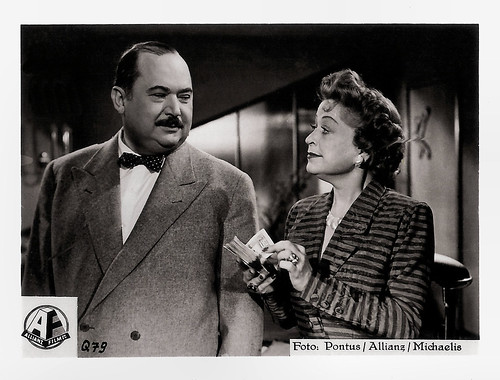
German collectors card. Photo: Pontus / Allianz / Michaelis. Publicity still for Die Verschleierte Maja/The Veiled Lady (Géza von Cziffra, 1951) with Grethe Weise.
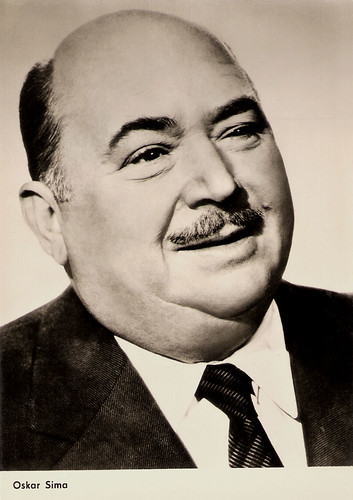
East-German postcard by VEB Progress Filmvertrieb, Berlin, no. 2.205, 1964.
After World War II, Oskar Sima returned in the cinema in the West German musical crime film Die Dritte von rechts/Third from the Right (Géza von Cziffra, 1950), starring Vera Molnar. During the 1950s, Sima was frequently asked as a character actor, causing his biographer to write, "... there was hardly a film in which Oskar Sima didn't act."
His films ranged from the Heimatfilm Grün ist die Heide/The Heath Is Green (Hans Deppe, 1951) starring Sonja Ziemann and Rudolf Prack to the Austrian historical drama Kaiserwalzer/The Emperor Waltz (Franz Antel, 1953), starring Maria Holst as Empress Elisabeth of Austria.
One of his best films of this era was the British musical Oh... Rosalinda! (Michael Powell, Emeric Pressburger, 1955), based on the operetta Die Fledermaus (The Bat) by Johann Strauss, but updated to take place in post-war Vienna as occupied by the four Allied powers: the United States, the United Kingdom, France and the USSR. Wikipedia: “Oh... Rosalinda!! is a light-hearted Technicolor romp that makes full use of the new CinemaScope process, and is not just a film of a staged production but a filmic operetta.”
Sima appeared in several 1950s remakes of major hits during the Weimar and Nazi eras, such as Der Kongreß tanzt/The Congress Dances (Franz Antel, 1955), Die Drei von der Tankstelle/The Three from the Filling Station (Hans Wolff, 1955), and Kirschen in Nachbars Garten/Fruit in the Neighbour's Garden (Erich Engels, 1956), in which Sima played the leading role.
Later he appeared in a new, Austrian version of Die Fledermaus/The Bat (Géza von Cziffra, 1962) starring Peter Alexander, Marianne Koch and Marika Rökk. His film career finished with the sex-comedy Susanne, die Wirtin von der Lahn/The Sweet Sins of Sexy Susan (Franz Antel, 1967). The commercial success of the film triggered the Frau Wirtin series of five films on later adventures of Susanne Delberg, all of them featuring Teri Tordai in the title role.
Oskar Sima suffered a heart attack in 1968 and he retreated to his horse ranch near Vienna. He languished for nearly a year before succumbing to his illness. In 1969, he died in his home town Langenzersdorf, Austria, at the age of 72. Shortly before his death he received the Filmband in Gold, the film award for many years of outstanding achievements in the German cinema.
DVD Trailer for Glückskinder/Lucky Kids (1936). Source: Murnau Stiftung (YouTube).
German trailer Besuch aus heiterem Himmel/Visit out of the blue (1959). Source: Dörfler Film (YouTube).
Sources: I.S. Mowis (IMDb), Filmportal.de, Wikipedia (German and English), and IMDb.

German cigarette card in the series Unsere Bunten Filmbilder by Ross Verlag for Cigarettenfabrik Josetti, Berlin, no. 198. Photo: Ufa.
Singular comic talent
Oskar Michael Sima was born in Hohenau an der March, Lower Austria, in 1896. He was the son of a baker. Sima attended high school in Vienna, followed by a trade school and then studied acting at the Vienna Conservatory.
In 1919, after his military service during World War I, he received an engagement at the Deutsches Theater in Prague, then at the Deutsches Volkstheater in Vienna. In 1927 he went to Berlin where he worked under Max Reinhardt and Erwin Piscator. Reinhardt recognised his singular comic talent and had him cast in satirical or comedic roles.
Sima’s film career started in 1921. Notable among his silent films are the Austrian Pat and Patachon comedy Schwiegersöhne/Sons in Law (Hans Steinhoff, 1926), and Leontines Ehemänner/Leontine's Husbands (Robert Wiene, 1928), with Claire Rommer and Georg Alexander.
Sima was frequently cast as the comic villain whose machinations get everyone into trouble, although many a times his villainous stature was used to more chilling effect. An example was the German silent crime film Kolonne X/Column X (Reinhold Schünzel, 1929), starring Reinhold Schünzel, Ernst Stahl-Nachbaur and Grete Reinwald. The film attempted to imitate the style of American crime films, switched to a German setting.
Interesting was also the German silent drama Die Frau, nach der man sich sehnt/The Woman One Longs For (Kurt aka Curtis Bernhardt, 1929) starring Marlene Dietrich, Fritz Kortner and Frida Richard. In 1929, Sima married actress Lina Woiwode. The couple remained married until Sima's death.
One of his first sound films was the drama Skandal um Eva/Scandalous Eva (Georg Wilhelm Pabst, 1930 in which he co-starred with Henny Porten. But in the following years, he only played supporting parts, such as in the German comedy drama Die Gräfin von Monte-Christo/The Countess of Monte-Christo (Karl Hartl, 1932) starring Brigitte Helm, the Austrian-German romantic comedy So ein Mädel vergißt man nicht/You Don't Forget Such a Girl (Fritz Kortner, 1932) starring Willi Forst and Dolly Haas, and the comedy Der Glückszylinder/The Magic Top Hat (Rudolf Bernauer, 1932) with Charlotte Ander and Felix Bressart. Many of these directors and actors soon fled the country, including Fritz Kortner, Dolly Haas and Felix Bressart.

German postcard by Ross Verlag, no. A 1724/1, 1937-1938. Photo: Majestic-Film. Publicity still for 5 Millionen suchen einen Erben/Five Millions Seek an Heir (Carl Boese, 1938).

German postcard by Margarinewerk Eidelstedt Gebr. Fauser G.m.b.H., Holstein, Serie 1, no. Bild 34. Photo: Marcus.
An active supporter of the Nazi Party?
During the national socialist era, Oskar Sima was identified as being an active supporter of the Nazi Party. In 1938, he applauded Austria's 'Anschluss' with Germany, and his career thrived during the 1930s. In Hungary he played in the German comedy Skandal in Budapest/Scandal in Budapest (Steve Sekely, Géza von Bolváry, 1933), starring Franziska Gaal. It was made by the German subsidiary of Universal Pictures, and a separate Hungarian-language version was also made. The film was remade in Hollywood as Top Hat (Mark Sandrich, 1935), starring Fred Astaire and Ginger Rogers.
Sima appeared at the side of Heinz Rühmann in the German comedy Heinz im Mond/Heinz in the Moon (Robert A. Stemmle, 1934), but also with Willy Fritsch and Lilian Harvey in the German romantic comedy Glückskinder/Lucky Kids (Paul Martin, 1936). I.S. Mowis at IMDb: “His stock-in-trade character was the surly curmudgeon: sometimes villainous, cigar-chewing and choleric, sometimes shifty and scheming, all the while deceptively amiable. At other times, he provided effective, often scene-stealing comedy relief, as pompous, easily deflatable editors, industrialists or burgomasters.”
Sima regularly returned to Austria for films, e.g. the operetta Zauber der Boheme/The Charm of La Bohème (Géza von Bolváry, 1937), starring Jan Kiepura and Mártha Eggerth.
After Austria had been incorporated into Greater Germany following the 1938 Anschluss, Sima often played in productions by Wien-Film, a Vienna-based company set up by the Nazis. He co-starred with Hertha Feiler and Attila Hörbiger in the drama Frau im Strom/Woman in the River (Gerhard Lamprecht, 1939), and appeared with Marte Harell in the musical comedy Wiener G'schichten/Vienna Tales (Géza von Bolváry, 1940).
For the Ufa, he appeared in the propaganda film Über alles in der Welt/Above All Else in the World (Karl Ritter, 1941), made to promote Nazi Germany's war aims in the Second World War. However, Oskar Sima was a curiously ambivalent man. I.S. Mowis at IMDb: “He went as far as to join the NSDAP, ostensibly, in order to continue performing. On the other hand, Sima appears also to have been associated with at least one resistance cell during the 1940's.”

German collectors card. Photo: Pontus / Allianz / Michaelis. Publicity still for Die Verschleierte Maja/The Veiled Lady (Géza von Cziffra, 1951) with Grethe Weise.

East-German postcard by VEB Progress Filmvertrieb, Berlin, no. 2.205, 1964.
1950s remakes of major hits during the Weimar and Nazi eras
After World War II, Oskar Sima returned in the cinema in the West German musical crime film Die Dritte von rechts/Third from the Right (Géza von Cziffra, 1950), starring Vera Molnar. During the 1950s, Sima was frequently asked as a character actor, causing his biographer to write, "... there was hardly a film in which Oskar Sima didn't act."
His films ranged from the Heimatfilm Grün ist die Heide/The Heath Is Green (Hans Deppe, 1951) starring Sonja Ziemann and Rudolf Prack to the Austrian historical drama Kaiserwalzer/The Emperor Waltz (Franz Antel, 1953), starring Maria Holst as Empress Elisabeth of Austria.
One of his best films of this era was the British musical Oh... Rosalinda! (Michael Powell, Emeric Pressburger, 1955), based on the operetta Die Fledermaus (The Bat) by Johann Strauss, but updated to take place in post-war Vienna as occupied by the four Allied powers: the United States, the United Kingdom, France and the USSR. Wikipedia: “Oh... Rosalinda!! is a light-hearted Technicolor romp that makes full use of the new CinemaScope process, and is not just a film of a staged production but a filmic operetta.”
Sima appeared in several 1950s remakes of major hits during the Weimar and Nazi eras, such as Der Kongreß tanzt/The Congress Dances (Franz Antel, 1955), Die Drei von der Tankstelle/The Three from the Filling Station (Hans Wolff, 1955), and Kirschen in Nachbars Garten/Fruit in the Neighbour's Garden (Erich Engels, 1956), in which Sima played the leading role.
Later he appeared in a new, Austrian version of Die Fledermaus/The Bat (Géza von Cziffra, 1962) starring Peter Alexander, Marianne Koch and Marika Rökk. His film career finished with the sex-comedy Susanne, die Wirtin von der Lahn/The Sweet Sins of Sexy Susan (Franz Antel, 1967). The commercial success of the film triggered the Frau Wirtin series of five films on later adventures of Susanne Delberg, all of them featuring Teri Tordai in the title role.
Oskar Sima suffered a heart attack in 1968 and he retreated to his horse ranch near Vienna. He languished for nearly a year before succumbing to his illness. In 1969, he died in his home town Langenzersdorf, Austria, at the age of 72. Shortly before his death he received the Filmband in Gold, the film award for many years of outstanding achievements in the German cinema.
DVD Trailer for Glückskinder/Lucky Kids (1936). Source: Murnau Stiftung (YouTube).
German trailer Besuch aus heiterem Himmel/Visit out of the blue (1959). Source: Dörfler Film (YouTube).
Sources: I.S. Mowis (IMDb), Filmportal.de, Wikipedia (German and English), and IMDb.
No comments:
Post a Comment